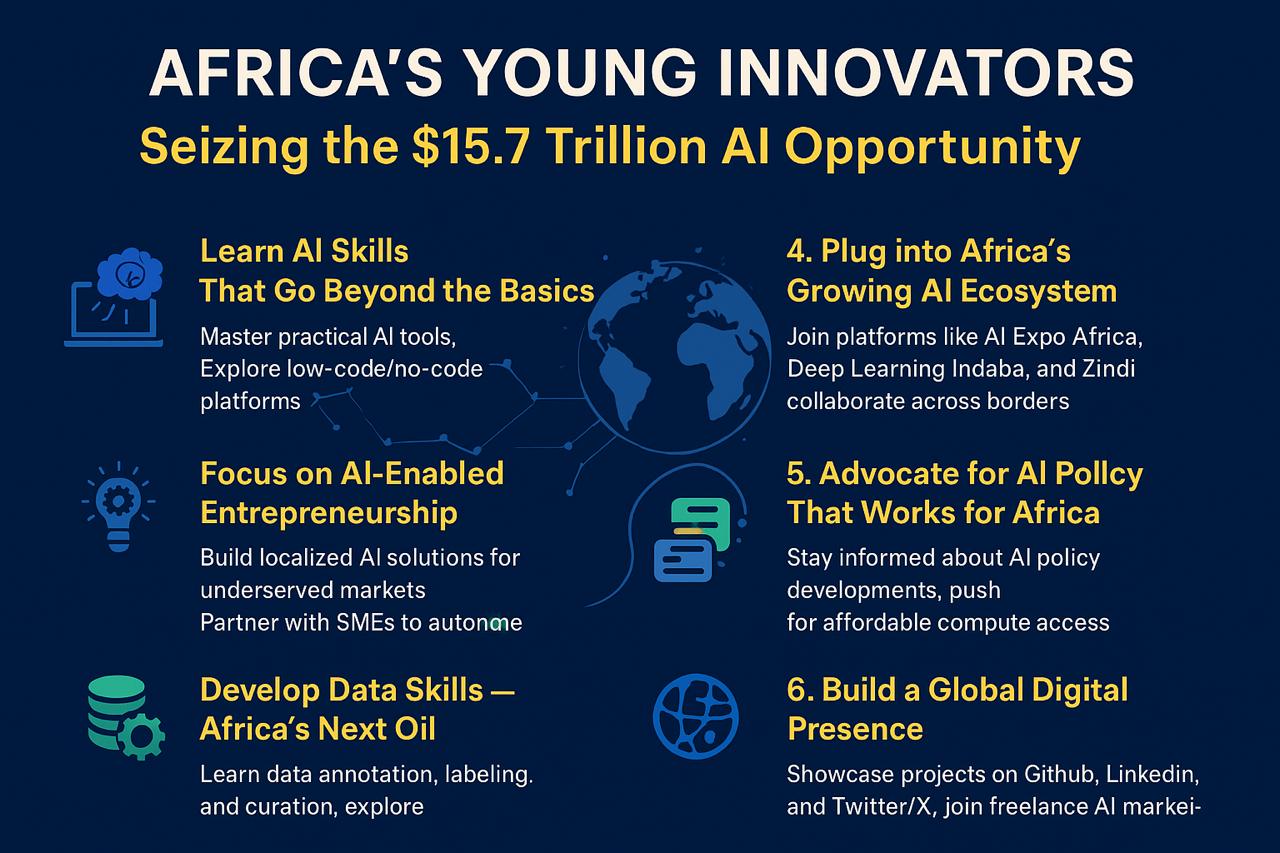In 2017, a landmark PwC report projected that artificial intelligence (AI) could inject up to $15.7 trillion into the global economy by 2030. Yet without strategic action, Africa may secure less than 10% of this value — despite having the world’s youngest population and some of the fastest-growing economies.
The next five years will decide whether Africa is a passive consumer of AI technology or a global leader shaping its future. For young Africans, this is not just a technology story — it’s a once-in-a-generation economic opportunity.
1. Learn AI Skills That Go Beyond the Basics
AI is no longer just for computer scientists — its value lies in application. Young people should:
- Master practical AI tools like Grok, ChatGPT, Claude, and Gemini for research, productivity, and business operations.
- Explore low-code/no-code AI platforms to create solutions without deep coding expertise.
- Specialize in areas with African market demand such as:
- AI for agriculture (smart irrigation, pest prediction)
- AI for fintech (fraud detection, credit scoring)
- AI for healthcare (diagnosis tools, telemedicine)
- AI for agriculture (smart irrigation, pest prediction)
Tip: Free resources like Google’s AI for Everyone, Microsoft Learn, and DataCamp for Africa can get you started.
2. Focus on AI-Enabled Entrepreneurship
Africa’s market gaps are AI’s biggest opportunities. Instead of competing in oversaturated global markets, young entrepreneurs can:
- Build localised AI solutions for underserved markets.
- Partner with SMEs to automate operations, marketing, and customer service.
- Leverage AI to create exportable digital products targeting global audiences.
Example: In Nigeria, fintech startups are using AI-powered chatbots to manage millions of customer queries — reducing costs and boosting reach.
3. Develop Data Skills — Africa’s Next Oil
AI thrives on data, but Africa has less than 2% of global data center capacity. Young people who can collect, clean, and manage African-specific datasets will be in high demand.
- Learn data annotation, labeling, and curation — foundational for AI training.
- Explore data governance to ensure ethical, secure data use.
Tip: Organisations like Zindi Africa run competitions that pay participants to solve AI challenges using African datasets.
4. Plug into Africa’s Growing AI Ecosystem
AI hubs, accelerators, and meetups are expanding across the continent. Being part of these communities opens doors to funding, mentorship, and partnerships.
- Join platforms like AI Expo Africa, Deep Learning Indaba, and Zindi.
- Collaborate across borders — African AI’s strength lies in pan-African cooperation.
Example: The newly launched AI Hub for Sustainable Development in Rome focuses on empowering African innovators with access to computing power and infrastructure.
5. Advocate for AI Policy That Works for Africa
AI regulation will shape who wins and who loses. Young Africans must:
- Stay informed about AI policy developments.
- Push for policies that ensure:
- Affordable compute access.
- Local data sovereignty.
- Fair funding distribution.
- Affordable compute access.
Tip: Student unions, tech communities, and youth councils can be powerful voices in AI policy discussions.
6. Build a Global Digital Presence
Opportunities in the AI economy aren’t limited by geography — but they do require visibility.
- Showcase your projects on GitHub, LinkedIn, and Twitter/X.
- Join freelance AI marketplaces to access global clients.
- Share content demonstrating your expertise — write about African AI challenges and solutions.
AI is projected to reshape the global economy — but projections don’t guarantee participation. For Africa’s youth, the next decade is a chance to leapfrog economic limitations by using AI to solve real problems at scale.
This is not just about learning to use AI — it’s about building African-owned AI solutions that generate wealth locally and globally.
If Africa can claim even a modest share of that $15.7 trillion, it could transform education, healthcare, agriculture, and industries across the continent.
The opportunity is here. The tools are free. The time is now.




